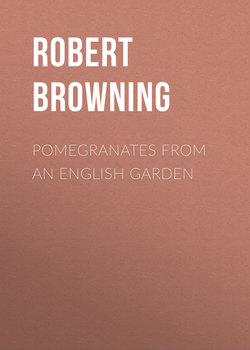Читать книгу Pomegranates from an English Garden - Robert Browning - Страница 11
THE LOST LEADER
ОглавлениеI
Just for a handful of silver he left us,
Just for a riband to stick in his coat —
Found the one gift of which fortune bereft us,
Lost all the others, she lets us devote;
They, with the gold to give, doled him out silver,
So much was theirs who so little allowed:
How all our copper had gone for his service!
Rags – were they purple, his heart had been proud!
We that had loved him so, followed him, honoured him,
Lived in his mild and magnificent eye,
Learned his great language, caught his clear accents,
Made him our pattern to live and to die!
Shakespeare was of us, Milton was for us,
Burns, Shelley, were with us, – they watch from their graves!
He alone breaks from the van and the freemen,
He alone sinks to the rear and the slaves!
II
We shall march prospering, – not thro’ his presence;
Songs may inspirit us, – not from his lyre;
Deeds will be done, – while he boasts his quiescence,
Still bidding crouch whom the rest bade aspire:
Blot out his name, then, record one lost soul more,
One task more declined, one more footpath untrod,
One more devil’s-triumph and sorrow for angels,
One more wrong to man, one more insult to God!
Life’s night begins: let him never come back to us!
There would be doubt, hesitation and pain,
Forced praise on our part – the glimmer of twilight,
Never glad confident morning again!
Best fight on well, for we taught him – strike gallantly,
Menace our heart ere we master his own;
Then let him receive the new knowledge and wait us,
Pardoned in heaven, the first by the throne!
“The Lost Leader” is supposed to be the poet Wordsworth, who, on accepting the laureateship, abandoned the party of distinguished literary men who had enthusiastically supported the principles of the French Revolution. It is necessary, of course, to enter into the lofty enthusiasm of that party, and for the moment to identify ourselves with it, in order to appreciate the wonderful power and pathos of this exquisite poem. (See Wordsworth’s “French Revolution as it appeared to enthusiasts at its commencement.”)
The contrasts are very powerful between the one (paltry) gift he gained, and all the others (love, loyalty, life, &c.) they were privileged to devote (far richer than mere possession); and again, between the niggardliness of his new patrons with their dole of silver, contrasted with the enthusiastic devotion of his own followers, who having nothing but “copper,” would yet put it all at his service – having nothing but “rags,” were yet so liberal with what they had, that had they been purple, he would have been proud indeed, seeing that “a riband to stick in his coat” had proved so great an attraction.
